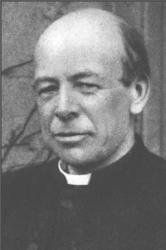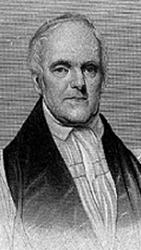Planning worship?
Check out our sister site, ZeteoSearch.org,
for 20+ additional resources related to your search.
- |
User Links
Person Results
‹ Return to hymnal




Export as CSV
Anna L. Barbauld

1743 - 1825 Hymnal Number: d63 Author of "Praise to God, immortal praise" in The Wayside Hymnal Barbauld, Anna Laetitia, née Aikin, daughter of the Rev. John Ailrin, D.D., a dissenting minister, was b. at Kibworth-Harcourt, Leicestershire, June 20, 1743. In 1753 Dr. Aikin became classical tutor at a dissenting academy at Warrington. During her residence there she contributed five hymns to Dr. W. Enfield's Hymns for Public Worship, &c, Warrington, 1772. In the following year these were included in her Poems, Lond., J. Johnson, 1773. In May, 1774, Miss Aikin was married to the Rev. Rochemont Barbauld, a descendant of a French Protestant family, and a dissenting minister. For some years Mr. Barbauld conducted, in addition to his pastoral work, a boarding school at Palgrave, Suffolk. From this he retired in 1785. In 1786 he undertook the charge of a small congregation at Hampstead, and from thence he passed to the dissenting chapel (formerly Dr. Price's) at Newington Green, in 1802. He d. Nov. 11, 1808. Mrs. Barbauld continued to reside in the neighbourhood until her death, March 9, 1825. In the latter part of the same year her niece published The Works of Anna Laetitia Barbauld, with Memoir, by Lucy Aikin, 2 vols., Lond., Longman, 1825. As a writer of hymns Mrs. Barbauld was eminently successful. Their use, however, with the exception of five contributed to Dr. W. Enfield's collection, is almost exclusively confined to the Unitarian hymnals of Great Britain and America. Including these hymnals, the whole of her hymns are still in common use. These hymns appeared thus:—
i. In Dr. W. Enfield's Hymns, &c., 1772.
1. Again the Lord of life and light. Easter.
2. Awake, my soul, lift up thine eyes. Conflict.
3. Behold, where breathing love divine. Christian Charity.
4. Jehovah reigns, let every nation hear. God's Dominion. A part of this was given in Collyer's Sel., 1812, No. 586, as:—
5. This earthly globe, the creature of a day.
6. Praise to God, Immortal praise. Harvest.
ii. Poems, 1773 (Preface dated Dec. 1, 1772). The whole of the above, and also:—
7. God of my life and author of my days. To God the Father. This is an “Address to the Deity," in 80 1. It is given in Martineau's Collection, 1840 and 1873. From it the following centos were given in Collyer's Selection> 1812:—
8. God, our kind Master, merciful as just.
9. If friendless in the vale of tears I stray.
iii. Poems revised 1792.
10. Come, said [says] Jesus' sacred voice. Invitation.
11. How blest the sacred tie that binds. Christian Fellowship.
12. Lo where a crowd of pilgrims toil. Pilgrimage of Life. From this is taken:—
13. Our country is Immanuel's ground [land].
iv. Leisure Hour Improved (Ironbridge), 1809.
14. Sweet is the scene when virtue dies. Death.
v. Supplement to the Unitarian Coll. of Kippis, Bees, and others, 1807.
15. When as returns the solemn day. Sunday.
16. Sleep, sleep to day, tormenting cares. Sunday.
17. How may earth and heaven unite. Worship.
vi. Works, with Memoir, 1825.
In vol. i. most of the above are reprinted, and the following are added :—
18. Joy to the followers of the Lord. Joy. (c. 1820.)
19. Pure spirit, O where art thou now. Bereavement. This is dated 1808.
20. Salt of the earth, ye virtuous few. Salt of the Earth.
21. When life as opening buds is sweet. Death. This is dated " November, 1814."
The more important of these hymns are annotated in this Dictionary under their first lines. Mrs. Barbauld's Hymns in Prose for Children, originally published in 1781, were long popular and have been translated into French, Italian, Spanish, and other languages.
-- John Julian, Dictionary of Hymnology (1907)
===================
Barbauld, Anna L., p. 113, ii. No. 18 on p. 114, i.,should be dated circa 1820. Another hymn in common use from Mrs. Barbauld's Works, &c, 1825, is, "O Father! though the anxious fear" (E. Taylor, p. 1117, in error).
--John Julian, Dictionary of Hymnology, Appendix, Part II (1907)
See also in:
Hymn Writers of the Church
Anna L. Barbauld
Athelstan Riley
1858 - 1945 Person Name: John Athelstan Riley Hymnal Number: d79 Author of "Alleluia, Alleluia, Alleluia" in The Wayside Hymnal Riley, John Athelstan Laurie, M.A., s. of John Riley, Mytholmroyd, Yorks, was born in London, Aug. 10, 1858, and educated at Eton and at Pembroke College, Oxford (B.A. 1881, M.A. 1883). He has been since 1892 a member of the House of Laymen of the Province of Canterbury. He was one of the compilers of The English Hymnal, 1906, and contributed to it seven translations from the Latin (34, 185, 193, 195, 213, 242, 321, with No. 97 previously published), and one from the Greek, beginning, "What sweet of life endureth," from Iiola rod fiiov, p. 899, i., and the following originals:—
1. Come, let us join the Church above. Martyrs.
2. Saints of God! Lo, Jesu’s people. St. Bartholomew. The initials of the lines form the acrostic Saint Bartholomew; it is really a general hymn for Apostles.
3. Ye watchers and ye holy ones. Universal Praise to God. [Rev. James Mearns, M.A.]
--John Julian, Dictionary of Hymnology, New Supplement (1907)
Athelstan Riley
Henry Scott Holland

1847 - 1918 Person Name: Henry S. Holland Hymnal Number: d39 Author of "Judge eternal, throned in splendor" in The Wayside Hymnal Holland, Henry Scott, D.D., son of G. H. Holland of Gayton Lodge, Wimbledon Common, was born Jan. 27, 1847, at Ledbury, Hereford, and educated at Eton and at Balliol Coll., Oxford (B.A. 1870, M.A. 1873, D.D. Aberdeen 1903). He became Senior Student of Christ Church, Oxford, in 1870, was ordained D. 1872, P. 1874, and has been Canon of St. Paul's, London, since 1884. His hymn, "Judge eternal, throned in splendour" (Prayer for the Nation), appeared in the Commonwealth for July 1902, and is in The English Hymnal, 1906, No. 423. [Rev. James Mearns, M.A.]
--John Julian, Dictionary of Hymnology, New Supplement (1907)
Henry Scott Holland
Martin Janus
1620 - 1682 Hymnal Number: d32 Author of "Jesu, joy of man's desiring" in The Wayside Hymnal Janus, Martin, seems to have been a native of Silesia, and to have been born about 1620. After receiving his license in theology, he became Precentor of the two churches at Sorau, in Silesia, then, about 1653, was appointed Rector of the Evangelical School at Sagan, and Precentor at the church near the Eckersdorf gate. He became Pastor at Eckersdorf about 1664, but was expelled by the Imperial Edict of March 13, 1668, by which all Evangelical pastors and teachers were driven out of the principality. He is said to have become Precentor at Ohlau, in Silesia, and died there about 1682. The only hymn by him translation into English is:—
Jesu meiner Seelen Wonne. Love to Christ. Included in the Christlich Herzens Andacht, Nürnberg, 1665 [Wolfenbüttel], No. 24, in 18 stanzas, repeated with his name in the Nürnberg Gesang-Buch, 1676, &c, and in Porst's Gesang-Buch, ed. 1855, No. 715. Sometimes erroneously ascribed to J. Scheffler. The translation is, "0! at last I did discover," beginning with stanza v. as No. 464 in pt. i. of the Moravian Hymn Book, 1754. In the 1789 and later eds. (1886, No. 338) it begins "0! at last I've found my Saviour." [Rev. James Mearns, M. A.]
--John Julian, Dictionary of Hymnology (1907)
Martin Janus
Charles T. Brooks

1813 - 1883 Hymnal Number: d21 Author of "God bless our native land, Firm may she" in The Wayside Hymnal Brooks, Charles Timothy. An American Unitarian Minister, born at Salem, Mass., June 20, 1813, and graduated at Harvard, 1832, and the Divinity School, Cambridge, U.S., 1835. In that year he began his ministry at Nahant, subsequently preaching at Bangor and Augusta (Maine), Windsor (Vermont). In 1837 he became pastor of Newport, Rhode Island, and retained the same charge until 1871, when he resigned through ill-health. [Rev. F. M. Bird, M.A.]
-- John Julian, Dictionary of Hymnology (1907)
================
Brooks, C. T. (p. 184, i,). He died at Newport, Rhode Island, June 14, 1883.
--John Julian, Dictionary of Hymnology, Appendix, Part II (1907)
Charles T. Brooks
J. Freeman Young
1820 - 1885 Person Name: J. F. Young Hymnal Number: d66 Author of "Silent night, holy night, all is calm, all is bright" in The Wayside Hymnal John Freeman Young (1820-1885)
Born: October 30, 1820, Pittston, Maine.
Died: November 15, 1885, New York City.
Buried: Old City Cemetery, Jacksonville, Florida.
Young attended Wesleyan University, Middletown, Connecticut; Wesleyan Seminary, Readfield, Maine; and the Virginia Theological Seminary, Alexandria, Virginia. Ordained a Protestant Episcopal minister, he served in Texas, Mississippi, Louisiana, and New York, and became the second bishop of Florida in 1867. His works include:
Carols for Christmas Tide (New York: Daniel Dana, Jr., 1859)
Hymns and Music for the Young, 1860-61
Great Hymns of the Church (editor; published posthumously in 1887 by John H. Hopkins)
--www.hymntime.com/tch
J. Freeman Young
Forward Movement Committee, Protestant Episcopal Church
Publisher of "" in The Wayside Hymnal
Forward Movement Committee, Protestant Episcopal Church
G. P. Symons
Hymnal Number: d44 Author of "Lift up your hearts, good Christian men" in The Wayside Hymnal
G. P. Symons
Alexander V. Griswold

1766 - 1843 Person Name: A. V. Griswold Hymnal Number: d26 Author of "Holy Father, great Creator, source of mercy" in The Wayside Hymnal Griswold, Alexander Viets, D.D., born at Simsbury, Connecticut, in 1766. After being for some time rector at Bristol, Rhode Island, he was consecrated bishop of the "Eastern Diocese," in 1811. He was subsequently Bishop of Massachusetts. He died in 1843, and his memoirs were published by Dr. J. S. Stone. His well-known hymn:—
Holy Father, great Creator. Holy Trinity. Was written probably in 1835. It appeared in that year in his Family Prayers, in 4 st. of 6 1. and entitled "Hymn to the God of Christians." With some alterations by Bishop Coxe, it was given in Hymns for Church and Home, &c, Phila., 1860, No. 153. It was repeated in the Hymnal .... of the Protestant Episcopal Church , 1871, No. 145.[Rev. F. M. Bird, M.A.]
-- John Julian, Dictionary of Hymnology (1907)
Alexander V. Griswold


 My Starred Hymns
My Starred Hymns


